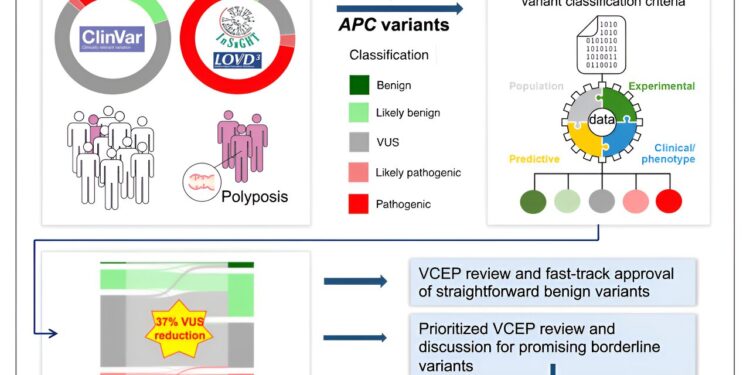Graphical summary. Credit: The American Journal of Human Genetics (2024). DOI: 10.1016/j.ajhg.2024.09.002
Genetic confirmation of a suspected diagnosis of hereditary colorectal cancer is of great importance for the medical management of affected families. However, many of the variants identified in known genes cannot yet be reliably classified in terms of their causal role in tumor formation.
Led by the University Hospital Bonn (UKB) and the University of Bonn, an international team of researchers reassessed the medical relevance of a significant number of unclear variants and thus significantly reduced their number. The results of the study have now been published in The American Journal of Human Genetics.
Families with hereditary tumor diseases are at high risk of developing certain cancers such as colon cancer or breast cancer. For many common hereditary tumor syndromes, there are now highly effective, intensive, and early cancer screening programs and other preventative measures. Rapid detection and reliable diagnosis of a hereditary predisposition are therefore extremely important for affected families.
However, thanks to increasingly comprehensive genetic testing, more and more genetic variants are being discovered in the causative genes, the causal importance of which in the development of tumors is not yet clear. These are called variants of uncertain significance (VUS). Result: more than 50% of variants of certain genes listed in international public databases (notably ClinVar) are now VUS.
“These cannot be used for diagnosis or to test healthy people at risk; on the other hand, they often create great uncertainty, because VUS carriers may have an increased risk of tumor “, explains Dr. Isabel Spier, co-senior author of the study. Institute of Human Genetics.
Many genetic variants have no relevance to tumor formation
Researchers at the UKB Center for Hereditary Tumor Syndromes have been working for years to identify new genetic causes of hereditary tumor diseases. To resolve problems associated with the interpretation of VUS, special classification criteria were developed under the leadership of the Institute of Human Genetics to improve the assessment of APC gene variants. Inherited genetic changes in this gene are responsible for familial adenomatous polyposis (FAP), one of the most common causes of hereditary colorectal cancer or hereditary polyps of the gastrointestinal tract.
As part of the Expert Panel on Variant Curation of Hereditary Colorectal Cancer/Polyposis (VCEP), the research group of Professor Stefan Aretz works with an international, multidisciplinary team of experts based on a collaboration between the International Society for Hereditary Gastrointestinal Tumors (InSiGHT) and the Clinical Genome Resource (ClinGen).
“The gene-specific classification criteria we developed have now allowed us to reclassify a significant proportion of APC gene VUS into a medically relevant category,” explains Professor Aretz, who is also a member of the Transgraduate Research Area (TRA). Life and health” at the University of Bonn.
The research team evaluated all of the more than 10,000 APC germline variants listed in the public ClinVar and LOVD databases. Of the variants initially classified as benign or pathogenic, approximately 95% remained in their original category. In contrast, 41% of VUS deposited in ClinVar and 61% of those in LOVD were reclassified into clinically significant classes, with the vast majority of them being benign.
Deep data mining, i.e. the comprehensive search of all globally available genetic and clinical information on a genetic variant, has also been shown to contribute very effectively to better classification. Overall, the total number of SUVs was reduced by 37%.
“Since we were able to evaluate a large proportion of SUVs as harmless standard variants, all carriers of these variants worldwide are relieved,” says co-senior author Professor Aretz, who would like to emphasize the narrow collaboration with the first author, Dr. Xiaoyu. Yin from Melbourne, Australia during her six-month stay as a visiting scientist at UKB.
The study also demonstrates the feasibility of variant classification in large datasets, which could also serve as a generalizable model for interpreting variants of other genes in the future.
More information:
Xiaoyu Yin et al, Large-scale application of ClinGen-InSiGHT APC-specific ACMG/AMP variant classification criteria leads to substantial reduction in VUS, The American Journal of Human Genetics (2024). DOI: 10.1016/j.ajhg.2024.09.002
Provided by University Hospital Bonn
Quote: Hereditary colorectal cancer: Researchers reclassify large proportion of major genetic variants as benign (October 1, 2024) retrieved October 1, 2024 from
This document is subject to copyright. Except for fair use for private study or research purposes, no part may be reproduced without written permission. The content is provided for informational purposes only.



